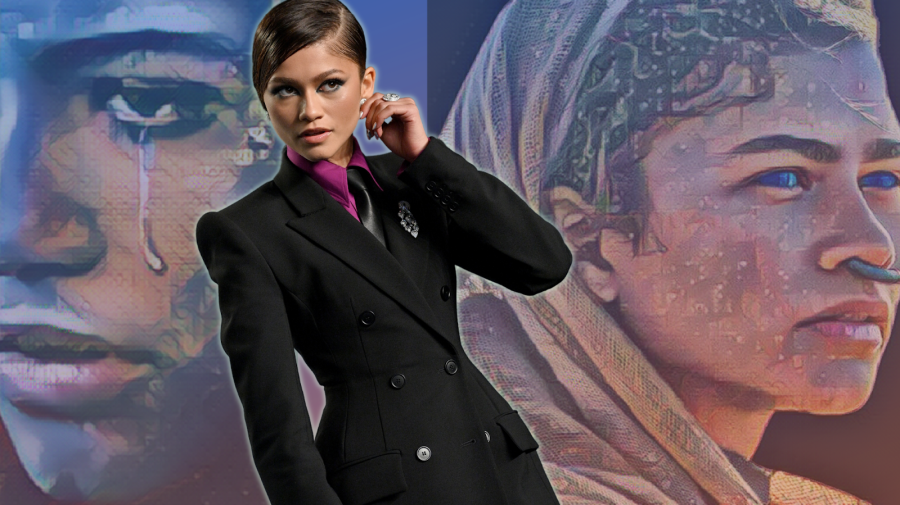
Years before she was cleaning up at the Emmys, Zendaya Coleman began her career as a backup dancer and model. Now, the former child star is an award-winning actor — aside from her Leading Actress Emmy she’s nabbed a People’s Choice Award, a Black Reel Award, an INOCA TV Award and a Satellite Award, just to name a few. But Zendaya isn’t just an incredible performer and musician.
If you’ve ever looked at photos from the Met Gala or any red-carpet event, odds are that you’ve seen Zendaya’s keen fashion sense. In addition to consistently being one of the best-dressed celebs out there, she has her own fashion line, Daya by Zendaya.
With 125 million followers on Instagram and 19 million followers on Facebook and Twitter, Zendaya, like many Gen Z stars, is a leading voice in pop culture — and culture at large. Although she doesn’t describe herself as an activist (more on that later), she uses her platform to spread awareness for a myriad of causes. In particular, she amplifies the concerns and voices of other Black Americans — and, in particular, women.
Here, we’re taking a look at how Zendaya, a former Disney star, became the award-winning lead of HBO’s Euphoria, all while cementing her place as a leading voice of her generation.
The MCU Spider-Man Trilogy (2017–21)
Back in 2017, Zendaya joined the Marvel Cinematic Universe (MCU) alongside Tom Holland, who’s now her partner in real life. Appearing in three Spidey films — Spider-Man: Homecoming (2017), Spider-Man: Far From Home (2019), and Spider-Man: No Way Home (2021) — Zendaya played MJ, Peter Parker’s (Holland) classmate and long-time love interest.
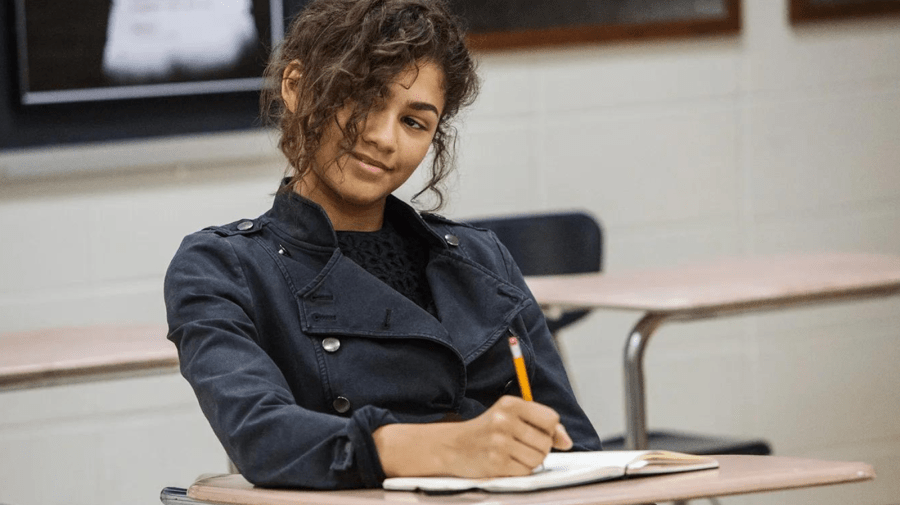
In a surprise to no one, (presumably white) fanboys were initially upset with the film’s casting choice — it’s no secret that racist (and transphobic) fans have thrown social-media fits about other casting choices in blockbuster franchises like Star Wars, too. Thankfully, Zendaya wasn’t driven off social media or sidelined like other Disney stars (see: Kelly Marie Tran).
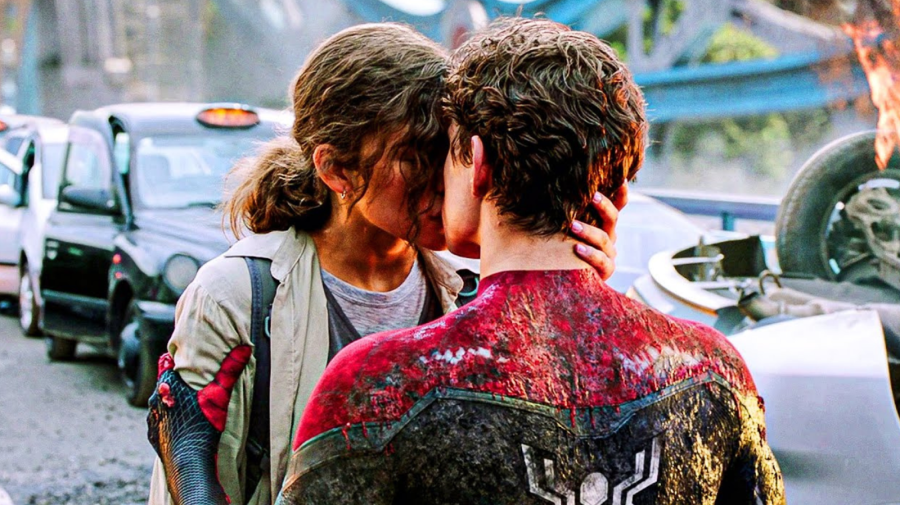
For her comedic and heartfelt performance as the sometimes-cool-as-a-cucumber and sometimes-awkward-and-nervous teen, Zendaya earned a Saturn Award. While Far From Home may have been an MCU highlight for her, Zendaya returned in the fan-favorite No Way Home, where she contended with not just one, but three Spideys.
Although her future in the MCU is uncertain — we won’t spoil the details, but Peter/Spider-Man is swinging solo by the end of No Way Home — she’s still with Holland. The two are sort of the celebrity couple internet darlings we didn’t know we needed. And to think, the first (public) sparks flew during that lip-sync battle featuring Tom’s truly incredible performance of “Umbrella”.
Euphoria (2019–)
In HBO’s teen drama series, Euphoria, Zendaya stars as Rue Bennett, a sarcastic, mentally ill queer and non-binary teen who’s recovering after a drug overdose, all while trying to find her place in the world. Rue’s Substance Use Disorder (SUD) is compounded by other mental illnesses; she’s depressed, something that’s only worsened since her dad died, and lives with bipolar disorder.
And Rue has no intention of staying clean — until she meets new girl in town Jules Vaughn (Hunter Schafer).
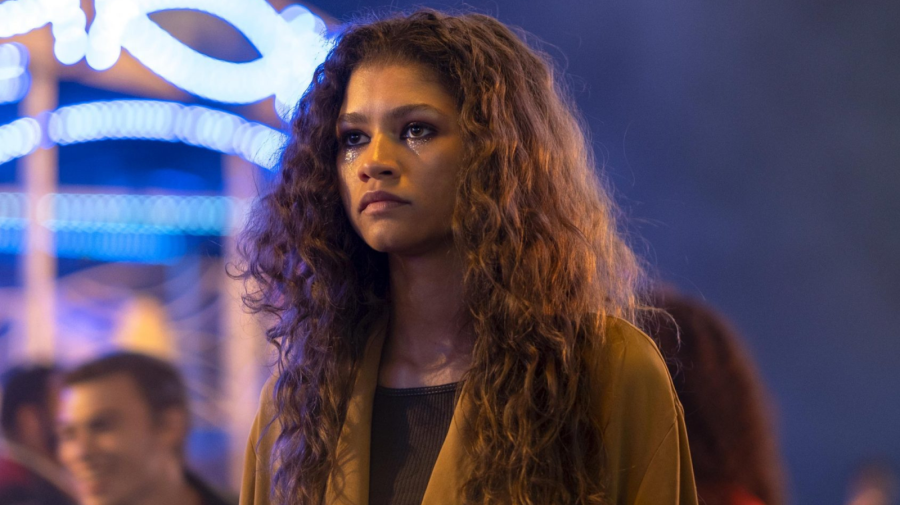
Instead of taking the Gossip Girl route, the Riverdale route or even the 13 Reasons Why route, Euphoria goes for a blunt, darker take on a group of high-school students. All of them struggle in their own ways — with social media, body image issues, self-esteem, money, love, mental illness, drugs — and they’re surrounded by adults who either helped shape this fraught, insular world, or aren’t much better off themselves.
There’s something darkly lyrical about Euphoria — it’s a character study and a stage play on screen, wrapped up in neon makeup, an incredible score and bits of the surreal — or unreal — that only serve to make it all the more real. We could wax poetic for a while, especially when it comes to the standalone “Rue” and “Jules” episodes.
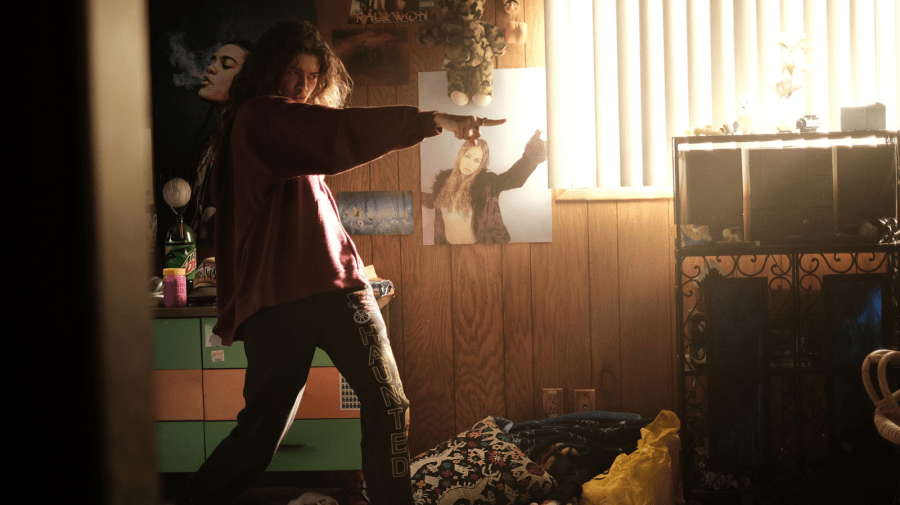
Let’s just say that, without a convincing Rue, one you care for even when she makes all the wrong decisions, there wouldn’t be a show. Zendaya’s performance earned her a spot in Emmy history: in 2020, she became the youngest woman to win an Emmy for a leading role in a drama series.
In her virtual acceptance speech, Zendaya noted that it felt like a weird time to be celebrating anything, and that she admired all the work her peers were doing in the streets — speaking out, marching and fostering other types of activism. For her, it’s not hard to see the spark of hope that young people embody, even if Euphoria doesn’t always lean into that sensibility.
Malcolm and Marie (2021)
In 2021, Netflix released another Sam Levinson/Zendaya project, Malcolm and Marie, which co-starred John David Washington. The film centers a toxic relationship between the titular characters (Washington and Zendaya, respectively); Malcolm, a filmmaker who’s about to make it in Hollywood used his girlfriend Marie’s story to build his career. Over the course of a night, all of the tension and tumult comes to a head — although it isn’t the first time.
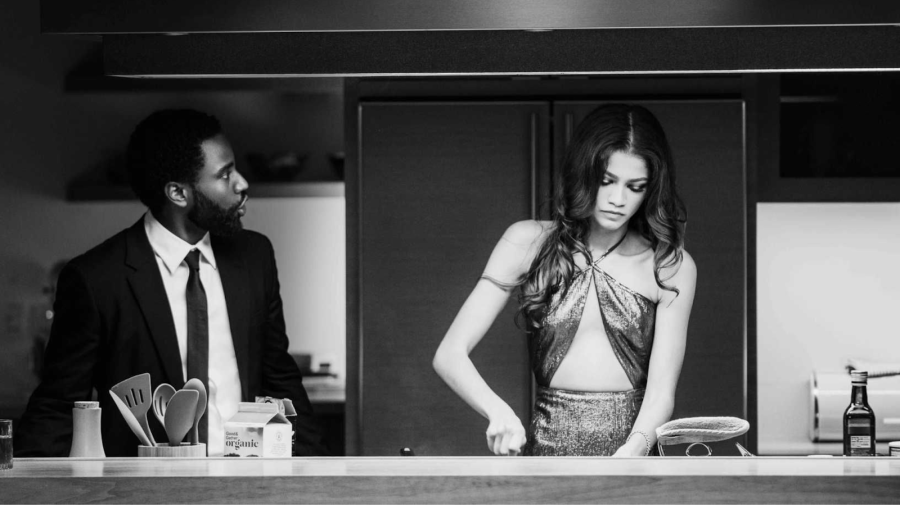
Shot in black-and-white, Malcolm and Marie is a heavy film, but its commentary on toxicity and the insecurities we bring to our relationships is cutting. Mostly, the performances are the standout thing here. But the film also received some backlash; it was written and directed by Levinson, a white man, and some viewers felt he shouldn’t be the one telling the story of two Black characters.
“What’s interesting is I think a little bit of our agency was stripped away,” Zendaya told the New York Times in reference to the backlash. “Like this was just kind of Sam spewing things through us without realizing that we are not only actors in this, but we’re co-financiers and producers… We do have the credit, this is ours — and John David, I, and Sam equally own this film.”
Dune (2021)
Although Zendaya only appears in Denis Villeneuve’s adaptation of Frank Herbert’s classic 1965 novel, Dune, for seven minutes, she certainly makes an impression. Not only on Paul Atreides (Timothée Chalamet), who has prophetic visions of her character, Chani, throughout, but on the audience, too.
With Herbert’s book exceeding 400 pages, it’s no wonder the filmmakers decided to split Dune into two films. Set in the distant future on a desert planet (Arrakis, a.k.a. “Dune”), this epic is full of world-building, lore and history. Villeneuve and his team made sure to carefully craft every element of the film with precision and care; from the incredible costume design to the inspired casting to the stunning cinematography, everything feels right.
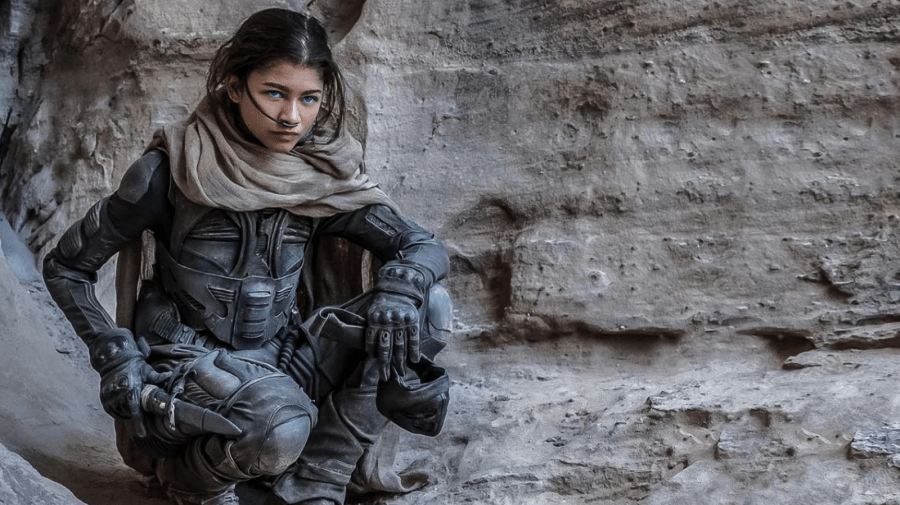
Expected to hit theaters in 2023, Dune: Part II will feature Zendaya’s Chani much more prominently. In the novel, the mysterious young woman is put in charge of protecting and guiding Paul when he and his mother, Lady Jessica (Rebecca Ferguson), are taken in by the desert planet’s Indigenous people, the Fremen. Paul is a sort of chosen one — a religious leader known among the Fremen as Muad’Dib.
As you might expect, Chani and Paul develop a romantic connection, and Chani, who’s already a skilled fighter, is trained in an ancient martial arts (the “weirding way”) by Paul and Jessica, making her a formidable ally in the planet-wide fight against the villainous Harkonnens. All of this to say, we can’t wait to see Zendaya take on this thrilling adventure when Part II comes out.
A Few Other Reasons Zendaya Is a Leading Voice Today
Zendaya’s Take on Being an Activist
Zendaya, a generation-defining actor, uses her platform to advocate for the rights of women, Black folks and LGBTQ+ people. As a result, many of us would, in fact, consider her an activist. But, in her own words, Zendaya doesn’t feel deserving of the title.
As a young Black woman in Hollywood, Zendaya certainly feels the pressure — not just to do great things, but to lift others up along the way. While speaking to Patrisse Cullors, the co-founder of the Black Lives Matter (BLM) movement, Zendaya described herself as, “an actress, but I’m also just a person who has a heart and wants to do the right thing.”
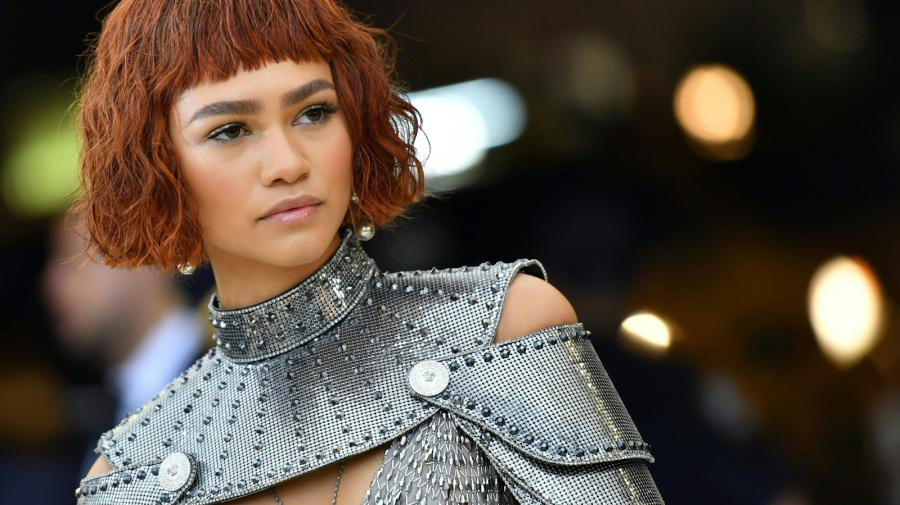
She reiterated these sentiments at a Hollywood Reporter roundtable, stating that she feels an obligation to be aware and spread awareness. Clearly, Zendaya wants to respect the work of full-time activists, and doesn’t want to compare herself to them. We appreciate the approach; for her, doing the right thing isn’t performative — and amplifying voices and social and political issues isn’t a trendy thing to do. For her, it all stems from a genuine urge to help others.
Her Inclusive Fashion Line, Daya by Zendaya
When Zendaya was a kid, her parents let her choose her own clothes. This, according to the actor and fashion lover, helped her figure herself out and develop a unique sense of style. This ownership over her identity and self, which stemmed in large part from fashion, culminated in a clothing label — Daya by Zendaya. Everything in Zendaya’s direct-to-customer brand is priced below $160, offering diverse and fashionable — yet accessible options — to a wider audience. We also love the line’s gender-neutral and size-inclusive approach.
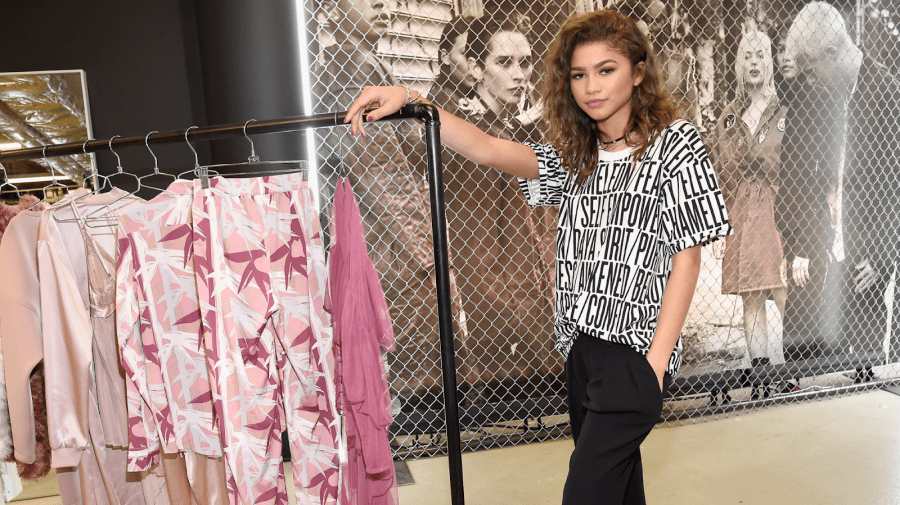
While Zendaya’s iconic looks at the Met Gala have helped make her the talk of the town before, she took things to a whole new level by collaborating with American designer Tommy Hilfiger. The Tommy x Zendaya collection stole the show at the New York Fashion Week. Hilfiger sent a note to guests ahead of the show, explaining that the collaboration was designed to “redefine power dressing at its core” and “celebrate and champion [the] empowerment [of women] through fashion.”
As a Mental Health Advocate, Zendaya Is Leading By Example
Anxiety often stems from some root cause — our bodies and minds want to protect us from reliving events that caused us pain, sadness or embarrassment, for example. Speaking candidly about her own anxiety, Zendaya identified a 2013 performance on The Ellen DeGeneres Show (2003–22) as her root. Due to a technical hitch, she wasn’t very proud with her performance in the end. To make matters worse, it was one of her first moments being recorded live (and, later, broadcast on TV).
But Zendaya found ways to manage her anxiety and put her mental health first. In sharing her experiences, she hopes to help others who deal with anxiety and anxious thoughts. Her advice? Step back from your triggers, from those things that activate your anxiety. For Zendaya, that meant taking a break from live performances and focusing on other aspects of her career. When she was ready to return to the live stage, so to speak, she found that it wasn’t as activating.
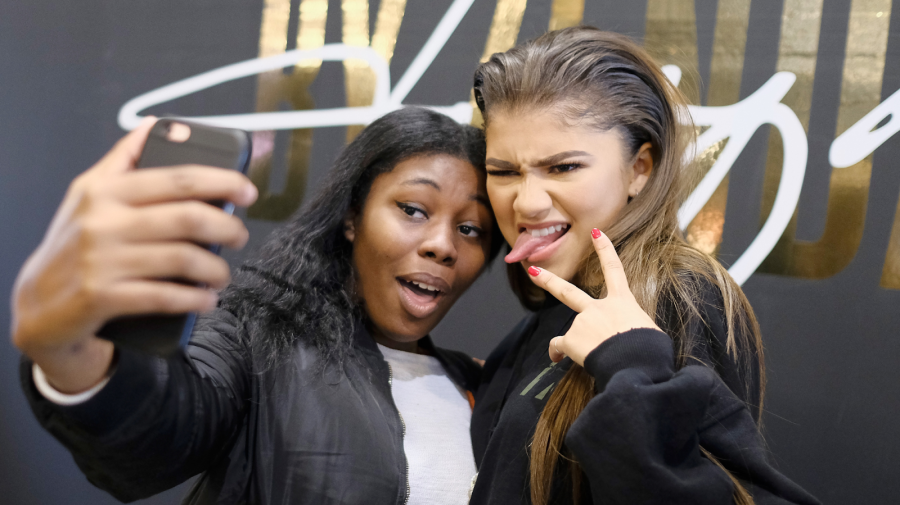
But sharing her experiences isn’t the only way Zendaya has shown she puts mental health first. Ahead of the premiere of Euphoria’s second season, the star took to social media and posted about how proud she was of the season, but also pointed out that watching Euphoria, with its potentially activating content, might not be a good decision for everyone. Here, Zendaya put her fans and their mental health first, acknowledging that they can support her while also doing what’s best for themselves.
Speaking Up For Trans Rights and Queer Stories
In an interview with British Vogue, Zendaya responded quite brilliantly to the age-old “What is feminism?” question. The actor said that true feminism has to be intersectional and inclusive of all women, whether they look like you or not, whether they share experiences with you or have experiences that differ.
With her role in Euphoria, Zendaya portrayed one of the only cis-trans love stories on TV, alongside trans co-star Hunter Schafer in the show’s first season. For playing a queer character so honestly and beautifully, and for bringing that much-needed representation to such an acclaimed show, Zendaya received a Gamechanger Award from the GLSEN in 2017.
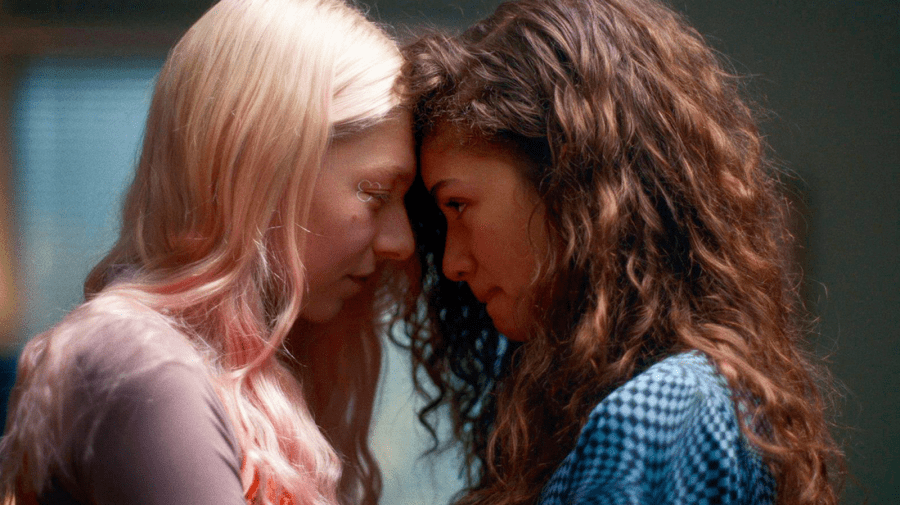
In small ways, she’s tried to move the dial away from heteronormativity, too. In an interview with Vanity Fair, she was asked, “What quality [do] you most like in a man?” — to which she replied, “I ‘most like in a person’, how about that?” Again, it might seem small but it’s those everyday, almost mundane acts of allyship that really help create change.
When asked about her interest in directing, Zendaya used the moment to not only talk about her future ambitions behind the camera, but share the kind of stories she hopes to help make more of down the line. “A simple love story about two Black girls,” she suggested. “Something simple and beautiful, that leaves you happy and wanting to fall in love yourself.” Without a doubt, we can’t wait to see — and feel — that.






